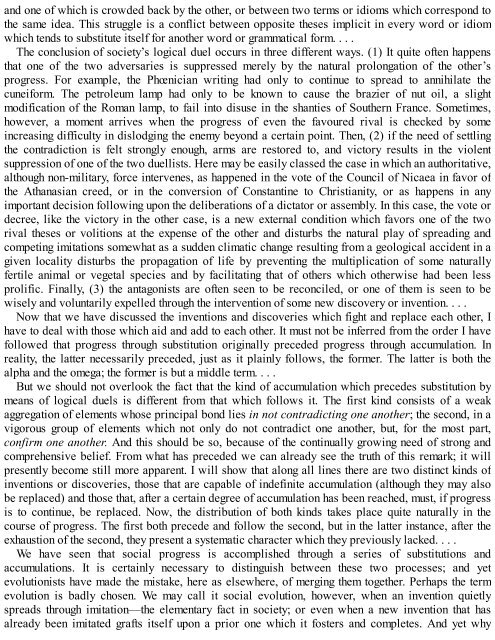3658925934
Create successful ePaper yourself
Turn your PDF publications into a flip-book with our unique Google optimized e-Paper software.
and one of which is crowded back by the other, or between two terms or idioms which correspond to<br />
the same idea. This struggle is a conflict between opposite theses implicit in every word or idiom<br />
which tends to substitute itself for another word or grammatical form. . . .<br />
The conclusion of society’s logical duel occurs in three different ways. (1) It quite often happens<br />
that one of the two adversaries is suppressed merely by the natural prolongation of the other’s<br />
progress. For example, the Phœnician writing had only to continue to spread to annihilate the<br />
cuneiform. The petroleum lamp had only to be known to cause the brazier of nut oil, a slight<br />
modification of the Roman lamp, to fail into disuse in the shanties of Southern France. Sometimes,<br />
however, a moment arrives when the progress of even the favoured rival is checked by some<br />
increasing difficulty in dislodging the enemy beyond a certain point. Then, (2) if the need of settling<br />
the contradiction is felt strongly enough, arms are restored to, and victory results in the violent<br />
suppression of one of the two duellists. Here may be easily classed the case in which an authoritative,<br />
although non-military, force intervenes, as happened in the vote of the Council of Nicaea in favor of<br />
the Athanasian creed, or in the conversion of Constantine to Christianity, or as happens in any<br />
important decision following upon the deliberations of a dictator or assembly. In this case, the vote or<br />
decree, like the victory in the other case, is a new external condition which favors one of the two<br />
rival theses or volitions at the expense of the other and disturbs the natural play of spreading and<br />
competing imitations somewhat as a sudden climatic change resulting from a geological accident in a<br />
given locality disturbs the propagation of life by preventing the multiplication of some naturally<br />
fertile animal or vegetal species and by facilitating that of others which otherwise had been less<br />
prolific. Finally, (3) the antagonists are often seen to be reconciled, or one of them is seen to be<br />
wisely and voluntarily expelled through the intervention of some new discovery or invention. . . .<br />
Now that we have discussed the inventions and discoveries which fight and replace each other, I<br />
have to deal with those which aid and add to each other. It must not be inferred from the order I have<br />
followed that progress through substitution originally preceded progress through accumulation. In<br />
reality, the latter necessarily preceded, just as it plainly follows, the former. The latter is both the<br />
alpha and the omega; the former is but a middle term. . . .<br />
But we should not overlook the fact that the kind of accumulation which precedes substitution by<br />
means of logical duels is different from that which follows it. The first kind consists of a weak<br />
aggregation of elements whose principal bond lies in not contradicting one another; the second, in a<br />
vigorous group of elements which not only do not contradict one another, but, for the most part,<br />
confirm one another. And this should be so, because of the continually growing need of strong and<br />
comprehensive belief. From what has preceded we can already see the truth of this remark; it will<br />
presently become still more apparent. I will show that along all lines there are two distinct kinds of<br />
inventions or discoveries, those that are capable of indefinite accumulation (although they may also<br />
be replaced) and those that, after a certain degree of accumulation has been reached, must, if progress<br />
is to continue, be replaced. Now, the distribution of both kinds takes place quite naturally in the<br />
course of progress. The first both precede and follow the second, but in the latter instance, after the<br />
exhaustion of the second, they present a systematic character which they previously lacked. . . .<br />
We have seen that social progress is accomplished through a series of substitutions and<br />
accumulations. It is certainly necessary to distinguish between these two processes; and yet<br />
evolutionists have made the mistake, here as elsewhere, of merging them together. Perhaps the term<br />
evolution is badly chosen. We may call it social evolution, however, when an invention quietly<br />
spreads through imitation—the elementary fact in society; or even when a new invention that has<br />
already been imitated grafts itself upon a prior one which it fosters and completes. And yet why









![Genki - An Integrated Course in Elementary Japanese II [Second Edition] (2011), WITH PDF BOOKMARKS!](https://img.yumpu.com/58322134/1/180x260/genki-an-integrated-course-in-elementary-japanese-ii-second-edition-2011-with-pdf-bookmarks.jpg?quality=85)
![Genki - An Integrated Course in Elementary Japanese I [Second Edition] (2011), WITH PDF BOOKMARKS!](https://img.yumpu.com/58322120/1/182x260/genki-an-integrated-course-in-elementary-japanese-i-second-edition-2011-with-pdf-bookmarks.jpg?quality=85)





